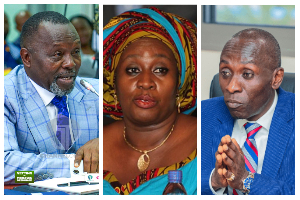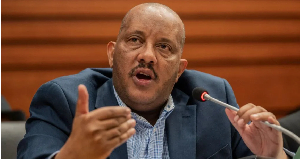Renowned banking consultant Dr. Richmond Atuahene raised serious concerns about governance practices at Consolidated Bank Ghana (CBG) following the Bank of Ghana’s (BoG) recent suspension of the bank’s forex license.
The Bank of Ghana has suspended the foreign exchange trading licence of Consolidated Bank Ghana (CBG) for one month, effective from 26th November 2024. This decision follows several regulatory breaches the Bank of Ghana identified, involving CBG’s foreign exchange operations.
In a statement issued on 12th November and signed by Secretary Sandra Thompson, the Bank of Ghana indicated that the suspension was imposed in accordance with section 11 (2) of the Foreign Exchange Act, 2006 (Act 723).
Commenting on the development on Morning Starr with Naa Dedei Tettey, Dr. Atuahene argues that deeper, systemic issues persist, calling for forensic audits and external oversight to restore confidence in the country’s financial regulatory framework.
Dr. Atuahene questioned the leadership within both CBG and the BoG, suggesting a troubling pattern of insufficient oversight and regulatory breaches. He highlighted longstanding issues with foreign exchange compliance, suggesting that CBG has failed to adequately report foreign currency transactions to the central bank, leading to the externalization of valuable foreign exchange resources.
“The role that we’ve been saying about good corporate governance, we know the state institution governance is nothing to write home about,” Dr. Atuahene stated. He emphasized that the core problem is a governance lapse, not only at CBG but also within the BoG’s supervisory division.
CBG, which was established through a merger of several distressed banks as part of the BoG’s banking sector clean-up in 2017-2018, serves as a state-owned financial institution and is expected to adhere to strict compliance guidelines to avoid repeating past crises.
Dr. Atuahene further alleged that CBG has engaged in remittance practices that circumvent the BoG’s foreign exchange regulations. He claimed that, in many cases, CBG converted incoming foreign remittances into Ghana cedis without receiving the equivalent foreign currency, resulting in a net outflow of foreign currency and undermining the nation’s economic stability.
“The remittance is what is happening with that. They’ve created cedi wallets, and the cedi comes in, and the dollar doesn’t come, the euro doesn’t come, the pound doesn’t come,” he said.
Citing data from BoG’s 2023 audit and financial statements, Dr. Atuahene contended that the lack of transparent reporting has led to severe underreporting of foreign currency receipts. He indicated that CBG’s practices have not only breached the Foreign Exchange Act but have also weakened the Ghanaian cedi by diminishing the supply of foreign currency in the economy.
Dr. Atuahene also took issue with BoG’s decision to suspend the bank’s forex license for just one month, arguing that it falls short of a true solution. He called for an independent forensic audit by external agencies, such as the International Monetary Fund (IMF) and the World Bank, to investigate the extent of the forex discrepancies.
According to Dr. Atuahene, such measures would ensure that all remittances are adequately accounted for and reduce foreign currency leakage from Ghana’s economy. He further suggested that if these issues were properly addressed, the country could recover billions in remittance flows, alleviating some of the pressure on the Ghanaian cedi.
As of the close of Tuesday, November 12, the cedi’s exchange rate showed a modest appreciation, but Dr. Atuahene warned that this trend is misleading.
He argued that the official rate does not reflect the true state of the market, where the actual rate is significantly higher in foreign exchange bureaus and informal markets. He described the central bank’s measures to maintain an artificial rate as a temporary fix that fails to address the fundamental economic issues.
He also expressed skepticism regarding CBG’s ability to resolve these issues within the one-month suspension period, describing the action as insufficient for rectifying deep-rooted problems.
Dr. Atuahene emphasized, “It’s time for us to appoint an external consultant to do a due diligence and to find how much money has been externalized and how they were using the cedi wallet to pay without accounting for the euro, the pound, [and] the dollar.”
The BoG has yet to respond to Dr. Atuahene’s call for an independent audit. However, financial experts argue that an external investigation could help bring about long-term reforms. Many Ghanaians hope that increased transparency and adherence to best practices in foreign exchange management will stabilize the cedi and secure Ghana’s financial sector against further crises.
As the month-long suspension takes effect, the public waits to see if the Bank of Ghana will consider Dr. Atuahene’s recommendations, potentially ushering in a new era of accountability and stability within the Ghanaian banking sector.
Business News of Wednesday, 13 November 2024
Source: starrfm.com.gh













